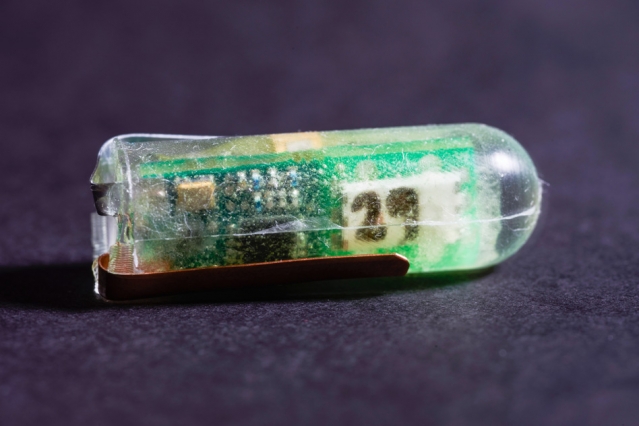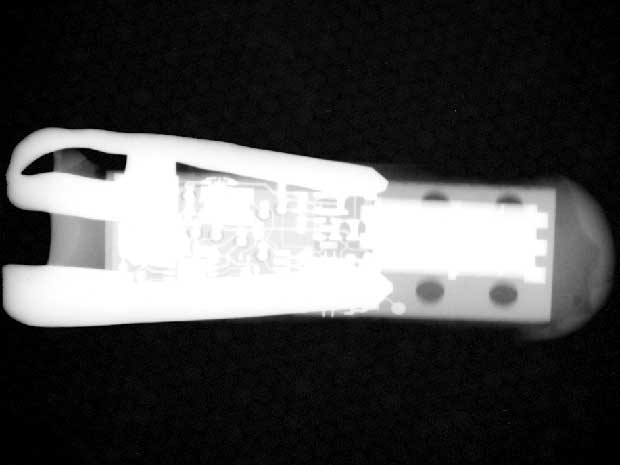MIT has created an electronic pill that is powered by stomach acid.

New electronic sensors and tablets open wide possibilities in medicine. Autonomous sensors that transmit information about the state of the body directly to the phone for a long time, medication dispensers - all this will be possible in the near future
Researchers at the Massachusetts Institute of Technology (Massachusetts Institute of Technology, MIT), together with colleagues from Brigham and Women's Hospital, developed and demonstrated a small electronic pill. It generates electricity under the action of gastric acid. Electricity is produced enough to ensure the operation of small sensors or miniature devices that deliver drugs. Such devices can remain in the esophagus for a long time (the developers talk about several weeks).
Usually, medical autonomous probes and other similar devices use traditional batteries, which are discharged over several days or even hours. The use of small-sized chemical batteries increases the cost of production of medical devices. Autonomous power supply could be an inexpensive alternative. "We need to find ways to provide energy to devices for a long time," said Giovanni Traverso, one of the research participants.
According to this specialist, an e-pill from MIT could be the solution. “We saw that the device provides a unique opportunity for new drug delivery systems and sensors in terms of power supply,” he says.
')
Traverso with partners has previously created and tested in work a large number of “swallowed” devices that can be used to determine various parameters of the body, such as temperature, pulse, respiration rate. Such devices can, already being inside the body, in batches to issue medicines. For example, this type of treatment is used to treat malaria.
“This work may lead to the creation of a new generation of electronic pills that will someday provide a new way to monitor patient health or cure diseases,” says one of the project participants. As already mentioned, miniature batteries that are used by physicians now, quickly discharged, plus they represent a certain danger. In order to overcome these shortcomings, electronic tablets have been developed.
The operation of the device is based on the principle of "citrus batteries". We are talking about two electrodes - for example, a nail and copper, which are inserted into a lemon from different ends and to which wires are connected. A potential difference arises, and a small current begins to flow through the wires, which is quite enough to turn on a low-power LED.
In order to repeat the design of the “battery of lemon”, the researchers decided to attach the zinc and copper electrodes to the surface of the usual medical swallowed sensor. As in the case of lemon, it begins to produce an electric current. It is enough to ensure the operation of the sensor and the 900 MHz transmitter.
Current testing of new-type devices is carried out on pigs. As it turned out, the gadget with an autonomous battery can work up to 6 days, being all this time in the digestive tract of the animal. In the stomach, a miniature battery produces enough electricity so that the sensor can collect data about the animal’s body and transmit this information wirelessly over a distance of up to 2 meters at a frequency of 12 seconds.

X-ray electronic sensor. Source: Jenny Haupt, Cody Cleveland and Phillip Nadeau
When the “pill” goes from the stomach to the small intestine, where the acidity is much lower, the performance of the “power plant” becomes lower, falling by two orders of magnitude. “But energy continues to be generated, so it can be accumulated and continue to transmit data, although less often than usual,” said Traverso.
The current prototype device has very small dimensions - only 40 millimeters in length and 12 millimeters in diameter. Scientists say that the final version of the “tablet” will be much smaller than the prototype, its size will be one third of the current one. The system will include a "power plant", a transmitter and a small microprocessor.
After the final miniaturization of devices of this type, scientists hope that such electronic tablets can be used as a long-term sensor that can determine the exact parameters of the human or animal organism. “We may have an electronic pill for self-sufficiency, which will transmit the parameters of the body for two weeks, and the patient will not need to do anything. All data is collected by the sensor and transmitted to the person’s phone, ”says Traverso.
In one of the studies, scientists demonstrated the possibility of drug delivery using a capsule with an autonomous "power station". As you move through the esophagus, this tablet produces small portions of drugs enclosed in the finest gold foil. Such hi-tech tablets can be used in cases where doctors need to constantly give certain doses of drugs to patients - for example, in the case of adjusting blood pressure.
Source: https://habr.com/ru/post/370145/
All Articles